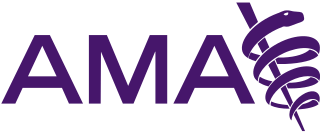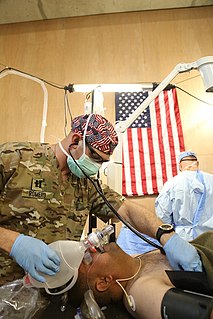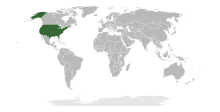
A pharmacist, also known as a chemist or a druggist, is a health professional who specializes in the preparation, properties, effects and use of medicines. The pharmacist provides pharmaceutical care to patients, as well as basic primary health care services. Using knowledge of the mechanism of action of drugs, the pharmacist understands how they should be used to achieve maximum benefit, minimal side effects and to avoid drug interactions. Pharmacists undergo university or graduate-level education to understand the biochemical mechanisms and actions of drugs, drug uses, therapeutic roles, side effects, potential drug interactions, and monitoring parameters. This is mated to anatomy, physiology, and pathophysiology. Pharmacists interpret and communicate this specialized knowledge to patients, physicians, and other health care providers.

The American Medical Association (AMA) is a professional association and lobbying group of physicians and medical students. Founded in 1847, it is headquartered in Chicago, Illinois. Membership was approximately 240,000 in 2016.
A physician assistant or physician associate (PA) is a type of mid-level health care provider. PAs may diagnose illnesses, develop and manage treatment plans, prescribe medications, and may serve as a principal healthcare provider. PAs are required in nearly all states to have a direct agreement with a physician for supervision and collaboration.

Primary care is the day-to-day healthcare given by a health care provider. Typically this provider acts as the first contact and principal point of continuing care for patients within a healthcare system, and coordinates other specialist care that the patient may need. Patients commonly receive primary care from professionals such as a primary care physician, a physician assistant, or a nurse practitioner. In some localities, such a professional may be a registered nurse, a pharmacist, a clinical officer, or an Ayurvedic or other traditional medicine professional. Depending on the nature of the health condition, patients may then be referred for secondary or tertiary care.

A nurse anesthetist is an advanced practice nurse who administers anesthesia for surgery or other medical procedures. They are involved in the administration of anesthesia in a majority of countries, with varying levels of autonomy.

Midwestern University (MWU) is a private graduate medical and professional school with the main campus in Downers Grove, Illinois, and an additional campus in Glendale, Arizona. As of the 2020-21 academic year, a total of 2,998 students were enrolled at the Downers Grove campus and 3,945 were enrolled at the Glendale campus.
A medical assistant, also known as a "clinical assistant" or healthcare assistant in the USA is an allied health professional who supports the work of physicians, nurse practitioners, physician assistants and other health professionals, usually in a clinic setting. Medical assistants can become certified through an accredited program. Medical assistants perform routine tasks and procedures in a medical clinic.
The Master of Public Health or Master of Philosophy in Public Health (M.P.H.), Master of Science in Public Health (MSPH), Master of Medical Science in Public Health (MMSPH) and the Doctor of Public Health (Dr.P.H.), International Masters for Health Leadership (IMHL) are interdisciplinary professional degrees awarded for studies in areas related to public health. The MPH degree focuses on public health practice, as opposed to research or teaching. Master of Public Health programs are available throughout the world in Schools of Public Health, Programs in Public Health, Medical Schools, and Schools of Public Affairs. MPH degrees, in addition to including a core curriculum, will usually also let students pursue a specialization in a specific field, such as epidemiology, ophthalmology, biostatistics, or health management.
Patient safety is a discipline that emphasizes safety in health care through the prevention, reduction, reporting, and analysis of error and other types of unnecessary harm that often lead to adverse patient events. The frequency and magnitude of avoidable adverse events, often known as patient safety incidents, experienced by patients was not well known until the 1990s, when multiple countries reported significant numbers of patients harmed and killed by medical errors. Recognizing that healthcare errors impact 1 in every 10 patients around the world, the World Health Organization calls patient safety an endemic concern. Indeed, patient safety has emerged as a distinct healthcare discipline supported by an immature yet developing scientific framework. There is a significant transdisciplinary body of theoretical and research literature that informs the science of patient safety.
A patient safety organization (PSO) is a group, institution, or association that improves medical care by reducing medical errors. Common functions of patient safety organizations are data collection and analysis, reporting, education, funding, and advocacy.

EngenderHealth is a 501(c)(3) nonprofit organization based in Washington, D.C., active in women's health and sexual and reproductive health (SRH) operating in nearly 20 countries Africa, Asia, and the Americas. The organization was established in 1943 and provided access to voluntary surgical contraception in the United States during its first 25 years. It has since expanded its mission to "training health care professionals and partnering with governments and communities to make high-quality family planning and sexual and reproductive health services available-today" and in the future.
International University is a private higher education institution specializing in medicine and medical science. Established in 2002, IU is recognized and nationally accredited by the Royal Government of Cambodia, the Royal Cambodian Ministry of Education, Youth & Sports and the Accreditation Committee of Cambodia (ACC). International University education standards are recognized by transnational medical institutions such as the Asia-Europe Foundation, ASAIHL, UN World Health Organization - including accreditation with the U.S.-based ECFMG, FAIMER and IMED enabling medical school graduates to take the three complete steps of the USMLE and on successful completion can register for physician residency and practice medicine in the United States. The medium of instruction used at IU are English and Khmer.

The Lake Erie College of Osteopathic Medicine (LECOM) is a private graduate school of medicine, dentistry, and pharmacy with a main campus in Erie, Pennsylvania, and branch campuses in Greensburg, Pennsylvania, Bradenton, Florida, DeFuniak Springs, Florida and Elmira, New York. Founded in 1992, LECOM confers medical (D.O.), dental (DMD), pharmacy (PharmD), as well as master's degrees in Health Services Administration, Biomedical Sciences, and Medical Education. LECOM operates one of the few accelerated three-year pharmacy programs in the country, and is one of 2 pharmacy schools in the country with a distance education program.
The Accreditation Council for Continuing Medical Education (ACCME) sets and enforces standards in physician continuing education within the United States. It acts as the overseeing body for institutions and organizations providing continuing medical education (CME) activities. The Council's seven founding member organizations are the American Board of Medical Specialties (ABMS), the American Hospital Association (AHA), the American Medical Association (AMA), the Association of American Medical Colleges (AAMC), the Association for Hospital Medical Education (AHME), the Council of Medical Specialty Societies (CMSS), and the Federation of State Medical Boards (FSMB). These organizations established the ACCME in 1980. The ACCME sets standards and certifies that institutions and organizations meet those standards. "CME credit" is part of special programs offered by other organizations and is not the purview of the ACCME. The ACCME's mission is to provide those in the medical field with opportunities to maintain competence and learn about new and developing areas of their field. A voluntary self-regulated system and a peer-review process are used to regulate and accredit medical education providers.
The basic requirement for pharmacists to be considered for registration is an undergraduate or postgraduate pharmacy degree from a recognized university. In many countries, this involves a four- or five-year course to attain a master of pharmacy degree (MPharm). In the United States of America, students graduating after January 1, 2003, must complete a doctor of pharmacy degree to become a licensed pharmacist. This same requirement has been coming into place in other countries such as Canada and France.
The California Medical Association (CMA) is a professional organization representing nearly 50,000 physicians in the state of California. The organization was founded in 1856 and is a constituent organization of the American Medical Association.

Ipas is an international, non-governmental organization that increases access to safe abortions and contraception. To this end the organization informs women how to obtain safe and legal abortions and trains relevant partners in Africa, Asia, and Latin America on how to provide and advocate for these.
The American College of Clinical Pharmacology® (ACCP) is a national organization of clinical pharmacology healthcare professionals who seek to advance clinical pharmacology.
The Society of Family Planning (SFP) is an international non-profit professional organization established in 2005 specializing in "abortion and contraception science" composed of physicians, nurses, sociologists, public health practitioners and trainees in these fields. The majority of member physicians include specialists of obstetrics and gynecology, family medicine, and adolescent medicine.








